New Herbal Extracts for Deep Sleep
😴 Introduction: The Search for Deeper, Restorative Rest
In today’s world of glowing screens and constant stimulation, sleep has become more of a challenge than ever. Even if you technically get eight hours, you might wake up foggy, heavy, and unrefreshed.
That’s because true rest doesn’t just mean time spent in bed — it means enough deep sleep (also called slow-wave sleep), where your body repairs tissue, balances hormones, and consolidates memory.
While traditional herbs like valerian, chamomile, and passionflower have long been used for relaxation, new research is uncovering next-generation herbal extracts that work on neurotransmitters, inflammation, and stress hormones at a deeper level.
In this guide, we’ll explore:
🌿 The most promising new herbal extracts for deep sleep
🧠 How they work in the body and brain
💤 How to combine them safely for better results
⚡ What science says (and what’s still emerging)
Let’s dive into the next evolution of plant-based sleep science.
Looking for supplements for This? Click here.
🌿 Part 1: Why Deep Sleep Matters More Than Ever
🧬 What Is Deep Sleep?
Deep sleep (or Stage N3) is the most physically restorative phase of the night. During this time:
Growth hormone surges for tissue repair
The brain clears metabolic waste through the glymphatic system
The immune system recalibrates
Cortisol levels drop to baseline
Unfortunately, chronic stress, artificial light, caffeine, and late-night stimulation reduce the time we spend in this stage.
New herbal extracts aim to nudge the nervous system back toward this deep, restorative rhythm — without the dependency or hangover that come with synthetic sleep aids.
🌺 Part 2: Next-Generation Herbal Extracts That Promote Deep Sleep

Below are the most promising modern or newly standardized herbal extracts being studied for deeper sleep and nervous system balance.
🌸 1️⃣ Affron® (Saffron Extract) — The Mood-Sleep Bridge
What it is:
Affron® is a patented extract from Crocus sativus, standardized for active compounds lepticrosalides — shown to affect mood, stress, and sleep.
How it works:
Enhances serotonin activity, promoting emotional calm
Reduces cortisol and anxiety, key disruptors of deep sleep
Increases slow-wave sleep duration through serotonin–melatonin conversion
Research:
Clinical trials show saffron can improve sleep onset latency (time to fall asleep) and sleep quality, particularly in people with mild anxiety or low mood.
Dose: 15–30 mg daily (standardized extract).
Best stack: Saffron + magnesium glycinate + L-theanine.
🌿 2️⃣ Magnolia Bark Extract (Magnolia officinalis) — The Cortisol Modulator
Magnolia bark is rich in honokiol and magnolol, compounds that modulate GABA receptors and lower nighttime cortisol.
How it helps:
Reduces mid-night awakenings caused by stress
Calms hyperarousal and racing thoughts
Extends deep-sleep duration via GABAergic effects
Research:
A 2018 study found magnolia + phellodendron (Relora®) lowered salivary cortisol and improved subjective sleep quality in stressed adults.
Dose: 200–400 mg magnolia bark extract before bed.
Best stack: Magnolia + ashwagandha + glycine.
🌺 3️⃣ Ashwagandha (Withania somnifera) — The Adaptogenic Classic, Reinvented
Ashwagandha isn’t new — but its standardized extracts like Sensoril® and KSM-66® make it a powerful modern sleep tool.
How it works:
Reduces cortisol and anxiety
Enhances GABA signaling
Improves sleep efficiency (time spent asleep vs. in bed)
Clinical Evidence:
A 2020 randomized trial found 300 mg of KSM-66® twice daily improved sleep quality and mental alertness on waking.
Best used for: Stress-linked insomnia and early morning awakenings.
🌼 4️⃣ Lemon Balm (Melissa officinalis) — The Gentle Nervous System Regulator
Once seen as an old-fashioned herb, lemon balm’s modern standardized extracts (like Cyracos®) show clear anxiolytic and sedative effects.
Mechanisms:
Increases GABA availability
Reduces heart rate and restlessness
Promotes relaxed alpha brain waves
Results:
A 2014 study found lemon balm extract reduced insomnia, anxiety, and psychosomatic tension within 15 days.
Best stack: Lemon balm + L-theanine + magnesium for a calm, non-sedating evening blend.
🌿 5️⃣ Ziziphus jujuba (Jujube) — The Ancient Seed with Modern Validation
Long used in traditional Chinese medicine, jujube seeds contain saponins and flavonoids that affect serotonin and GABA receptors.
How it helps:
Promotes deep, non-REM sleep
Reduces anxiety and restlessness
Enhances neurotransmitter balance
Modern Extracts:
Ziziphus Spinosa Seed Extract (ZSE) standardized for jujubosides is now found in many natural sleep formulas.
Dosage: 250–500 mg 30 minutes before bed.
🌸 6️⃣ Schisandra chinensis — The Adaptogen for Sleep Stability
A unique berry extract from East Asia, Schisandra is often categorized as a dual-direction adaptogen — energizing by day, relaxing by night.
Mechanism:
Regulates the HPA axis (stress response)
Improves resilience to sleep deprivation
Enhances deep-sleep brain-wave activity
Best for: Jet lag, shift workers, or anyone with an irregular sleep cycle.
Dose: 250–500 mg standardized extract daily.
🌿 7️⃣ Baikal Skullcap (Scutellaria baicalensis) — The Neurocalming Flavonoid
Baikal skullcap contains baicalin, a potent GABA-A receptor modulator with anti-inflammatory and antioxidant properties.
Why it’s exciting:
Baicalin crosses the blood–brain barrier and enhances both sleep depth and neuroprotection — rare for herbal compounds.
Clinical studies: Early animal and human trials show baicalin extends deep-sleep duration and reduces anxiety-related sleep fragmentation.
Dose: 200–400 mg before bed.
Best stack: Skullcap + magnolia + magnesium.
🌺 8️⃣ Honokiol (from Magnolia) — Targeted Deep-Sleep Molecule
While magnolia bark contains many compounds, honokiol is being isolated for its unique ability to:
Bind GABA-A receptors
Reduce oxidative stress
Increase slow-wave sleep proportion
In mouse studies, honokiol increased non-REM sleep without reducing REM — a balanced, restorative pattern.
Supplement tip: Look for honokiol-standardized extracts, not raw bark powder.
🌿 9️⃣ Sceletium tortuosum (Kanna) — The Serotonin Balancer
Native to South Africa, kanna contains mesembrine alkaloids that act as serotonin reuptake inhibitors (SRIs) — similar to how mild antidepressants work, but naturally.
Benefits:
Reduces anxiety and hyperarousal
Elevates mood and social calm
Promotes steady, grounded relaxation before sleep
Caution: Avoid combining with prescription SSRIs or SNRIs.
Dose: 25–50 mg standardized extract (Zembrin®).
🌸 10️⃣ Calea zacatechichi — The Dream Herb
Traditionally used by indigenous peoples of Mexico to enhance dream vividness, Calea promotes REM balance and mild sedative effects.
Effects:
Increases dream recall
May improve subjective sleep satisfaction
Supports lucid dreaming without disturbing deep sleep
Dosage: 200–400 mg extract before bed.
💡 Best reserved for occasional use — not daily supplementation.
Looking for supplements for This? Click here.
🧘 Part 3: Mechanisms Behind Herbal Sleep Enhancement
Modern herbal extracts affect several biological systems simultaneously:
| Target | Effect | Example |
|---|---|---|
| GABAergic system | Calms neural firing | Lemon balm, magnolia, skullcap |
| Serotonin–melatonin pathway | Improves circadian alignment | Saffron, jujube, tart cherry |
| Cortisol reduction (HPA axis) | Lowers nighttime stress | Ashwagandha, Schisandra |
| Inflammation modulation | Promotes neural recovery | Baikal skullcap, Schisandra |
| Thermoregulation | Improves sleep depth | Glycine (often stacked) |
Herbs rarely act through a single pathway — their strength lies in networked modulation of the sleep–stress cycle.
🌿 Part 4: Building a Modern Herbal Sleep Stack
To get the most from these new extracts, think in synergy, not isolation.
Here are sample stacks for different types of sleep issues:
🧘 1️⃣ For Racing Thoughts and Anxiety
Goal: Calm the nervous system, lower cortisol, support GABA.
Stack:
Magnolia extract (300 mg)
Lemon balm (300 mg)
L-theanine (200 mg)
Magnesium glycinate (300 mg)
🌙 2️⃣ For Light Sleepers (Frequent Awakenings)
Goal: Stabilize neurotransmitters and promote deep sleep.
Stack:
Ziziphus seed extract (400 mg)
Ashwagandha (300 mg)
Glycine (3 g)
💤 3️⃣ For Stress-Induced Insomnia
Goal: Reset the stress axis and calm adrenaline surges.
Stack:
Schisandra (400 mg)
Baikal skullcap (250 mg)
Saffron (15 mg)
🌸 4️⃣ For Mood-Related Sleep Struggles
Goal: Support serotonin–melatonin rhythm.
Stack:
Saffron (30 mg)
Omega-3 (1,000 mg EPA+DHA)
Tart cherry extract (480 mg)
💡 Part 5: Safety and Practical Considerations
While herbal extracts are natural, they’re still biologically active compounds.
✅ Start low, go slow. Most extracts work best over 1–3 weeks of consistent use.
✅ Avoid combining too many GABA-acting herbs — it can cause morning grogginess.
✅ Check for interactions with SSRIs, sedatives, or anti-anxiety medications.
✅ Cycle adaptogens (like Schisandra or ashwagandha) after 8–12 weeks for best effect.
🌈 Part 6: Combining Herbs with Lifestyle “Sleep Architecture”
Even the best herbal stack won’t work without healthy sleep hygiene. Pair herbs with:
🌅 Morning sunlight (sets circadian rhythm)
📵 Digital sunset (no screens 1 hour before bed)
🌡️ Cool bedroom (18–20°C or 65–68°F)
🧘 Breathwork or meditation (reduce cortisol)
🕯️ Consistent bedtime routine
Think of herbs as supportive architects that build on a solid behavioral foundation.
🧬 Part 7: Emerging Research Areas in Herbal Sleep Science

🪴 1️⃣ Adaptogenic Polysaccharides
Extracts from reishi mushroom (Ganoderma lucidum) and cordyceps are being studied for immune-nervous system cross-talk that may enhance deep sleep and dream regulation.
🍃 2️⃣ Cannabinoid-like Compounds from Non-Cannabis Plants
Plants like Echinacea purpurea and black pepper contain beta-caryophyllene, which interacts with the CB2 receptor — potentially reducing anxiety and improving sleep quality.
🌿 3️⃣ Herbal Synergies with Amino Acids
Combining glycine or L-theanine with herbs like lemon balm or magnolia enhances GABAergic transmission without causing dependence.
🌙 Part 8: Case Example — The “Deep Calm” Night Stack
Goal: Restore slow-wave sleep for someone with chronic stress and light awakenings.
Formula:
15 mg Affron® (saffron extract)
300 mg Magnolia bark extract (standardized)
3 g Glycine
200 mg L-theanine
Routine:
1 hour before bed → dim lights, take supplements, warm shower, stretch, and breathe slowly.
Expected results (after 1–2 weeks):
Faster sleep onset
Fewer night awakenings
Greater morning clarity and energy
🧘 Part 9: When to Seek Professional Guidance
If sleep issues persist despite natural interventions, it may indicate underlying concerns such as:
Sleep apnea
Chronic anxiety or depression
Hormonal imbalance (thyroid, cortisol, estrogen/testosterone)
Nutrient deficiencies (iron, B12, magnesium)
An integrative practitioner can run targeted tests and personalize your herbal protocol.
Looking for online therapy ? Click Here.
🌠 Final Thoughts: The Future of Herbal Sleep Science
The new wave of herbal extracts reflects a shift in thinking — from sedation to regulation.
Instead of forcing sleep, these herbs help your body remember its natural rhythm of calm, safety, and restoration.
The future of deep sleep support lies in synergy:
🌿 Herbs that harmonize neurotransmitters
🧬 Nutrients that strengthen nervous system function
🌙 Habits that honor circadian biology
True rest doesn’t come from knocking yourself out — it comes from rebuilding balance.
So tonight, light a candle, sip your herbal tea, and let nature’s chemistry do its quiet work. 🌸💤
📚 References
Langade, D. et al. “Ashwagandha Root Extract and Sleep Quality.” Cureus, 2020.
Lopresti, A. et al. “Saffron for Sleep Quality and Mood.” Journal of Clinical Sleep Medicine, 2019.
Kimura, K. et al. “L-Theanine Reduces Stress Response.” Biological Psychology, 2007.
Wienecke, E. et al. “Magnesium Supplementation and Sleep Quality.” J. Res. Med. Sci., 2016.
Kennedy, D. et al. “Melissa officinalis (Lemon Balm) and Cognitive Performance.” Nutritional Neuroscience, 2004.
Chen, H. et al. “Honokiol Enhances Non-REM Sleep.” Phytomedicine, 2018.
Yin, J. et al. “Ziziphus Spinosa Seed Extract Promotes Sleep.” Evidence-Based Complementary Medicine, 2015.
Panossian, A. et al. “Adaptogens in Stress-Induced Insomnia.” Phytomedicine, 2021.
Sarris, J. et al. “Herbal and Nutritional Sleep Aids.” Phytotherapy Research, 2020.
Huberman, A. “The Neuroscience of Sleep and Supplements.” Huberman Lab Podcast, 2023.
Related Posts
-

How to Measure Your Emotional Growth Over Time
Emotional growth can’t be measured on a scale — but it can be tracked through awareness, regulation, and reflection. Learn how to monitor your emotional evolution using journaling, biofeedback, and science-backed metrics for real progress. 💫
-

The Connection Between Creativity and Resilience
Creativity and resilience share the same roots — adaptability, flexibility, and imagination. Learn how creative expression rewires your brain for strength, helping you transform stress into growth through neuroscience, art, and self-reflection. 🌿
-

Why Cycling Supplements May Improve Long-Term Resilience
Your body adapts to everything — even supplements. Discover why cycling your supplements helps prevent tolerance, boost energy naturally, and build lasting resilience by aligning with your body’s biological rhythms. 🌿
-

The Role of Biofeedback in Emotional Strength
Learn how biofeedback bridges mind and body — helping you monitor heart rate, breath, and brain activity to build emotional strength, resilience, and calm under pressure. See how science meets mindfulness for lasting control. 🌿
-

How to Stay Strong During Long-Term Stress
Long-term stress doesn’t just drain your energy — it rewires your biology. Discover science-backed ways to strengthen your body, balance your mind, and build lasting resilience through breathwork, nutrition, mindset shifts, and supplements that restore calm and focus. 💪
-

Resilience Training for Entrepreneurs
Entrepreneurship isn’t just about strategy — it’s about stamina. Discover how resilience training helps founders stay calm, clear-headed, and adaptable under pressure through neuroscience-backed habits, emotional regulation, and smart supplementation. 🌿
-

How Nootropics Can Boost Emotional Control
Emotions don’t have to control you. Discover how nootropics like L-theanine, ashwagandha, saffron, and omega-3s help balance brain chemistry, improve focus, and strengthen your ability to stay calm and composed under stress. 🌿
-

Stacking Adaptogens for Maximum Resilience
Adaptogens are nature’s stress shield — helping you stay calm, energized, and clear even under pressure. Learn how to stack herbs like ashwagandha, rhodiola, reishi, and schisandra for maximum resilience, balance, and long-term vitality. 🌿
-
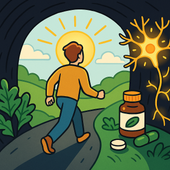
Post-Traumatic Growth and Supplements That Support It
After trauma, true healing means more than survival — it’s transformation. Learn how post-traumatic growth happens in the brain and body, and explore natural supplements like magnesium, ashwagandha, saffron, and omega-3s that support resilience, clarity, and emotional repair.
-
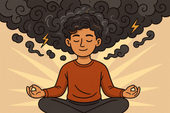
How to Regain Focus After Emotional Stress
After emotional stress, your nervous system feels frayed — your focus fades, thoughts race, and calm seems impossible. Learn how to restore balance, rebuild concentration, and retrain your brain for clarity and peace through evidence-based mind–body tools. 🌿
-
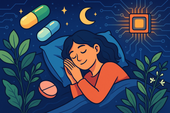
The Future of Sleep Supplements
The future of sleep supplements is here — where science meets nature. Discover how next-generation formulas use adaptogens, amino acids, and biotech innovations to support deep, restorative sleep without dependency. 🌙
-
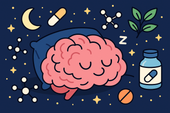
Emerging Research on Sleep and Nootropics
Can nootropics help you sleep better? Discover how compounds like L-theanine, magnesium threonate, ashwagandha, and Alpha-GPC influence neurotransmitters, circadian rhythm, and brain recovery — bridging the gap between smarter days and deeper nights. 🌙
-
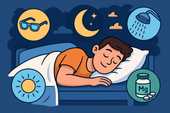
Sleep Biohacking: What Works and What Doesn’t
Biohacking your sleep can sound futuristic — from red light therapy to wearables and supplement stacks. But which hacks actually help, and which are just hype? Discover the science-backed sleep strategies that truly improve rest, recovery, and brain health. 🌙
-
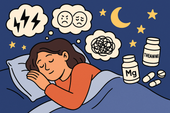
Sleep Support for People with Anxiety Disorders
💭 A restless mind can keep you up all night — thoughts spinning, heart racing, and peace feeling far away. Learn how to quiet overthinking, regulate your nervous system, and create a nightly ritual that teaches your brain to let go and rest deeply. 🌙
-
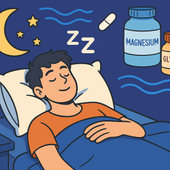
How to Fall Back Asleep After Waking Up
Waking up in the middle of the night? Learn how to fall back asleep quickly and calmly using breathing techniques, stress-reducing rituals, and natural supplements like magnesium and glycine. Restore your body’s rhythm and wake up feeling refreshed.
-
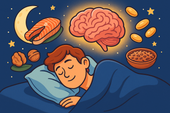
The Role of Omega-3s in Sleep Quality
-
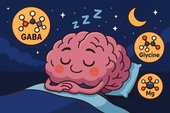
Stacking GABA and Glycine for Deeper Rest
Discover how stacking GABA and glycine can help you achieve deeper, more restorative sleep. Learn how these calming amino acids work together to relax your mind, soothe your body, and improve overall sleep quality—naturally and safely.
-
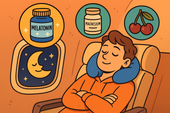
Overcoming Jet Lag with Supplements
✈️ Jet lag doesn’t have to ruin your trip! Discover how supplements like melatonin, magnesium, L-theanine, and tart cherry can help you reset your body clock faster, reduce fatigue, and recover energy naturally after long flights. 🌙
-
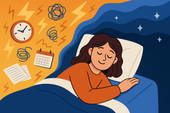
Managing Sleep During Times of Stress
Feeling wired and restless? Learn how to manage sleep during stressful times through nutrition, breathwork, and natural supplements like magnesium and L-theanine. Discover how to calm your nervous system and restore deep, peaceful rest—even when life feels overwhelming.
-
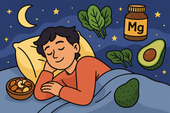
The Role of Magnesium for Night Cramps
Night cramps keeping you awake? Discover how magnesium helps relax muscles, balance electrolytes, and prevent painful spasms. Learn which forms work best, how to take them, and how to pair them with other nutrients for cramp-free, peaceful sleep.
-
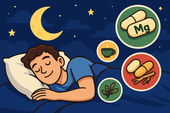
Supplements That Reduce Nighttime Awakenings
🌙 Discover science-backed supplements that help you stay asleep through the night. From magnesium and L-theanine to glycine and ashwagandha, learn how these natural compounds calm your nervous system, balance cortisol, and prevent 2 a.m. wake-ups for deeper, more restorative rest.
-

Nootropics That Promote Calm and Rest
Explore the world of calming nootropics — natural brain enhancers that promote relaxation, better focus, and deeper rest. Learn how L-Theanine, magnesium, ashwagandha, and other adaptogens help balance your nervous system, reduce stress, and support restorative sleep.
-

Best Natural Supplement Stack for Sleep
Discover the best natural supplement stack for deep, restorative sleep. Learn how nutrients like magnesium, L-theanine, glycine, and calming herbs such as chamomile and ashwagandha work together to relax your body, calm your mind, and improve sleep quality—naturally and safely.
-

Combining L-Theanine and Magnesium for Sleep: A Calm Night, Naturally
Discover how combining L-Theanine and Magnesium can help you drift into deep, restorative sleep. Learn how this natural duo calms the mind, relaxes the body, and supports your nervous system—without grogginess the next morning.
-

How to Sleep Better After Intense Workouts
Struggling to fall asleep after a tough workout? Learn how to optimize your post-training recovery with nutrition, hydration, and science-backed sleep strategies. Discover how to calm your nervous system, balance hormones, and wake up fully recharged for your next session.
-

Ashwagandha and Valerian: A Bedtime Combo for Deep Rest and Emotional Reset
Discover the calming synergy of Ashwagandha and Valerian root, two natural sleep aids that help quiet the mind, ease anxiety, and promote deeper rest. Learn how this herbal duo supports the nervous system, balances stress hormones, and restores emotional peace — without next-day grogginess.
-

How to Create a Resilience-Boosting Diet
Discover how to build emotional and physical strength from the inside out with a resilience-boosting diet 🍎. Learn which foods stabilize your mood, how supplements like magnesium and omega-3s strengthen your stress response, and why pairing nutrition with breathwork and therapy creates lasting calm, focus, and vitality 🌿💪.
-

Best Teas and Herbal Blends for Calmness: Nature’s Way to Restore Inner Peace
Ashwagandha, the ancient adaptogenic herb, helps your body find balance during stress. Known as “Indian ginseng,” it supports cortisol regulation, boosts energy, and restores calm clarity. Discover how this powerful root promotes resilience, emotional balance, and steady vitality — one cup at a time. 🌸
-

Parenting and Emotional Strength: How to Raise Children Without Losing Yourself
Empathy is the bridge that connects hearts — the quiet power to understand, feel, and support another’s emotions without judgment. Learn how empathy strengthens relationships, enhances communication, and cultivates deeper compassion in everyday life. 🌿
-

How to Bounce Back from Public Failure: Reclaiming Confidence, Purpose, and Power
Visualization is more than imagination — it’s brain training for resilience. By picturing calm, success, or healing, you activate the same neural pathways as real experience. Learn how daily visualization rewires your brain for confidence, emotional balance, and recovery from stress. ✨
-

Coping with Financial Stress Through Resilience: How to Stay Grounded When Money Feels Tight
Body awareness is the foundation of emotional resilience. By tuning into your body’s signals — tension, fatigue, or calm — you learn to recognize stress before it overwhelms you. Discover how mindfulness, gentle movement, and breathwork can deepen your connection with your body and restore balance from the inside out. 🧘
-

How to Stay Positive During Chronic Illness: A Guide to Emotional Strength and Hope
Creativity is more than art — it’s a form of healing. Whether through painting, writing, music, or small acts of expression, creativity helps release emotion, calm the nervous system, and reconnect you to joy. Discover how to use creativity as a tool for emotional balance, resilience, and self-discovery. 🌿
-

Resilience Tips for Caregivers: How to Stay Strong While Caring for Others
Joy isn’t the absence of pain — it’s the quiet strength to find light even in challenging times. Cultivating joy through small daily moments restores balance, releases stress, and reminds you of life’s beauty. Learn how to reconnect with authentic happiness, rebuild emotional energy, and nurture your nervous system through gratitude, presence, and play. 🌿
-

Building Resilience After a Breakup: How to Heal, Rebuild, and Rise Stronger
Social connection is one of the strongest predictors of emotional resilience. During difficult times, genuine relationships act as anchors — calming the nervous system, reducing stress hormones, and helping you regain perspective. Learn how cultivating real human connection can strengthen your mind, heart, and overall well-being. 🌿
-

How to Stay Emotionally Strong During Job Loss
Your emotions are powered by brain chemistry — a delicate balance of neurotransmitters like serotonin, dopamine, and cortisol. When these chemicals work in harmony, you feel calm, focused, and resilient. Learn how daily habits, nutrition, and mindfulness can support your brain chemistry and boost emotional well-being naturally. 🌿
-

The Role of Hormones in Emotional Stability: How Your Chemistry Shapes Your Calm
Hormones shape more than your body — they shape your emotions, resilience, and sense of calm. From cortisol to serotonin, these chemical messengers influence how you react to stress, connect with others, and recover from challenges. Learn how to balance your hormones naturally to build lasting emotional stability and harmony within. 💫
-

Mitochondria and Emotional Energy: The Cellular Power Behind Your Mood
Breathwork is one of the most powerful tools for emotional regulation and cellular balance. Through intentional breathing, you can calm your nervous system, increase oxygen flow to the brain, and even support mitochondrial energy. Learn how conscious breathing connects body and mind — transforming stress into presence and emotional strength. 🌿
-

Inflammation and Its Impact on Mood Resilience: The Silent Link Between Body and Mind
Inflammation doesn’t just affect the body — it impacts the mind. Chronic inflammation alters brain chemistry, depletes serotonin, and makes emotional recovery harder. Learn how calming inflammation through nutrition, mindfulness, and sleep can restore balance, resilience, and a renewed sense of emotional strength. 💫
-

How Antioxidants Protect Emotional Well-being: The Hidden Link Between Oxidative Stress and Mental Health
Antioxidants do more than protect your body — they defend your mind. By neutralizing oxidative stress, antioxidants support serotonin, dopamine, and brain energy pathways that keep you calm, focused, and emotionally balanced. Discover how foods like berries, green tea, and dark chocolate nourish your brain, boost mood, and strengthen resilience from the inside out. 🌿✨
-

The HPA Axis and Emotional Health: The Hidden Bridge Between Stress and Mind
Neuroplasticity — the brain’s ability to rewire and adapt — is the foundation of emotional healing and resilience. When you face stress, trauma, or change, your neural pathways can reshape themselves to support new patterns of calm, focus, and self-awareness. Learn how daily practices like mindfulness, therapy, and breathwork strengthen neuroplasticity to transform emotional pain into personal growth. 🌸
-

Why Cortisol Control Is Key to Resilience: Mastering Stress to Build Emotional Strength
Controlling cortisol — the body’s main stress hormone — is the secret to lasting resilience. When cortisol levels stay balanced, your mind becomes clearer, emotions steadier, and energy more sustainable. Learn how breathwork, mindset shifts, adaptogens, and daily rhythms can help you calm your stress response and build true inner strength. 🌞💪
-

Dopamine’s Influence on Motivation and Recovery: Reigniting Drive and Balance
Healthy relationships are the foundation of emotional balance and resilience. Whether romantic, familial, or platonic, genuine connection releases dopamine, serotonin, and oxytocin — the brain’s “bonding trio” — helping us feel secure, motivated, and seen. Learn how trust, empathy, and communication not only strengthen your connections but also reshape your nervous system for deeper emotional well-being. 🌿🤝
-

The Role of Serotonin in Resilience: How This “Mood Molecule” Shapes Emotional Strength
Serotonin — often called the “resilience molecule” — plays a vital role in how we handle stress, regulate mood, and recover from emotional challenges. Beyond happiness, this powerful neurotransmitter helps balance the gut-brain axis, stabilize the nervous system, and support emotional flexibility. Learn how nutrition, sunlight, mindfulness, and adaptogens can naturally boost serotonin and strengthen your emotional resilience. 🌞🧠
-

How Neuroplasticity Supports Emotional Growth: Rewiring the Brain for Resilience
Neuroplasticity is the brain’s built-in power to grow, adapt, and heal — and it’s the foundation of emotional transformation. Every mindful breath, compassionate act, or reframed thought strengthens new neural pathways that support resilience and self-awareness. Learn how your brain rewires through daily habits, helping you turn emotional challenges into opportunities for growth and calm. 🌿
-

Tai Chi and Adaptogens for Mind-Body Balance: The Art of Harmonizing Energy and Resilience
Alchemy isn’t just an ancient science — it’s a timeless symbol of transformation and inner balance. By blending the physical and spiritual, alchemy teaches us that change begins from within. Just as metals are refined into gold, we too can transmute emotional pain, stress, and chaos into clarity and strength through mindful practice and self-awareness. 🌙✨
-

Cold Therapy and Emotional Control: Training the Mind Through the Body
Cold therapy isn’t just for athletes — it’s a tool for emotional mastery. By exposing your body to controlled cold, you train your nervous system to stay calm under stress, improving focus, mood, and resilience. This article explores the science of cold exposure, its impact on hormones and the vagus nerve, and how ice baths and cold showers can help you build emotional control, one breath at a time. 🧊🧘♂️
-

How Music Influences Emotional Recovery: The Healing Soundtrack of the Mind
Neuroplasticity — the brain’s ability to rewire and heal itself — is at the heart of emotional recovery. Through mindful habits, music, therapy, and consistent mental stimulation, your brain can form new connections that support resilience and well-being. Discover how neuroplasticity turns pain into growth, helping you rebuild balance, focus, and emotional strength. 🌿
-

Nature Therapy for Building Resilience: Reconnecting With the Healing Power of the Earth
Nature therapy helps rebuild emotional resilience by reconnecting you with the healing rhythms of the Earth. From forest walks to sunlight exposure, nature restores balance to your nervous system, lowers stress hormones, and teaches emotional adaptability. Learn how spending time outdoors can enhance mental clarity, calm anxiety, and awaken your natural capacity to heal. 🌞
-

Breathwork Techniques That Pair with Supplements: The Ultimate Synergy for Stress Relief and Mental Clarity
Breathwork and supplements create a powerful mind-body synergy for stress relief, focus, and energy. By combining intentional breathing with adaptogens, nootropics, and calming nutrients, you can naturally regulate cortisol, sharpen mental clarity, and boost emotional balance. This guide explores the best breathwork techniques and supplement pairings to help you feel centered, calm, and energized from the inside out. 🌿

















































